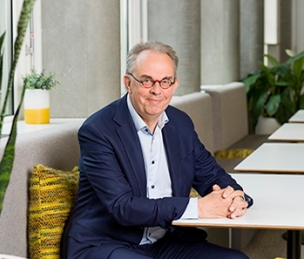Primary tabs
Peter Hagoort is director of the Max Planck Institute for Psycholinguistics (since November 2006), and the founding director of the Donders Institute, Centre for Cognitive Neuroimaging (DCCN, 1999), a cognitive neuroscience research centre at the Radboud University Nijmegen. In addition, he is professor in cognitive neuroscience at the Radboud University Nijmegen. His own research interests relate to the domain of the human language faculty and how it is instantiated in the brain. In his research he applies neuroimaging techniques such as ERP, MEG, PET and fMRI to investigate the language system and its impairments as in aphasia, dyslexia and autism.
For his scientific contributions, the Royal Netherlands Academy of Arts Sciences (KNAW) awarded him with the Hendrik Mullerprijs in 2003. In 2004 he was awarded by the Dutch Queen with the "Knighthood of the Dutch Lion". In 2005 he received the NWO-Spinoza Prize (M€ 1.5). In 2007 the University of Glasgow awarded him with an honorary doctorate in science for his contributions to the cognitive neuroscience of language. In 2008 he was awarded with the Heymans Prize. In 2012 the KNAW awarded his career contribution to the cognitive neuroscience with the Academy Professorship Prize (M€ 1.0). He received the Distinguished Career Award (DCA) of the Society of the Neurobiology of Language in 2021. During the opening of the Academic Year 2023/2024 Peter Hagoort was awarded the Universiteitspenning in zilver (Silver University Medal) from the Radboud University. The medal is only occasionally awarded for special contributions to the university - only five times in the 100 years of university's history. In May 2024 he will receive the Yuen Ren Chao Prize in Language Sciences for his contributions to the interdisciplinary studies in cognitive neuroscience and the understanding of human language processing in the brain. This Prize is initiated and hosted by the Faculty of Humanities of the Hong Kong Polytechnic University to recognise distinguished contributions to language science research.
Peter Hagoort is member of the Royal Netherlands Academy of Arts and Sciences (KNAW), of The Koninklijke Hollandsche Maatschappij der Wetenschappen, and of the Academia Europaea. In 2018 Peter Hagoort was elected as international member of the National Academy of Sciences and as Fellow of the Cognitive Science Society.
Other affiliations:
Professor of Cognitive Neuroscience, Radboud University, Nijmegen, the Netherlands. [link]
Director Donders Centre for Cognitive Neuroimaging, Nijmegen, the Netherlands.
Principal Investigator Donders Institute for Brain, Cognition and Behaviour, Nijmegen, the Netherlands.
- Press
Vooral kennis maakt weerbaar tegen een pandemie (Trouw publication, 4-7-2020)
Huidige model van taal in de hersenen klopt niet (interview NPO Radio 1, 15-10-2019)
Al in de baarmoeder zijn we gevoelig voor taal (interview Eos Magazine, 17-10-2019, PDF)
Over sprekende auto’s, communicerende marsmannetjes en breintaal (lezing door Peter Hagoort in de miniserie Taal in het Paradijs op 17 december 2017 in Paradiso)
Het zijn de feiten, stommeling! (Volkskrant publication, 27-4-2017)
Peter Hagoort zet het brein te kijk (Footage NPO3 TV, 15-5-2013, 55 min.)
Peter Hagoort, KNAW laureaat Prijs Akademiehoogleraren 2012 (juni 2012, 5 min)
KWG - MPG 100 year: Peter Hagoort video portrait (by Henk Visser, 2011, 7 min.)
Niet voor bangeriken (Footage NPO Start, 21-11-2010, 45 min.)
- PhD students
Ph.D. students with completed doctoral dissertations
Click here to download a list of PhD students with completed doctoral dissertations (1996 - 2024).
Current Ph.D. students
Nienke Hoeksema (2019)
Nationality: Dutch
Project: The comparative neurobiology of vocal learning in batsSara Mazzini (2020)
Nationality: Italian
Project: The role of intro- and inter-brain neural synchrony in face-to-face communicationMargot Mangnus (2020)
Nationality: Dutch
Project: The Neural Dynamics of Communication in Context in Autism Spectrum ConditionsJanniek Wester (2024)
Nationality: Dutch
Project: Perception of humanness as a category in speech

Share this page